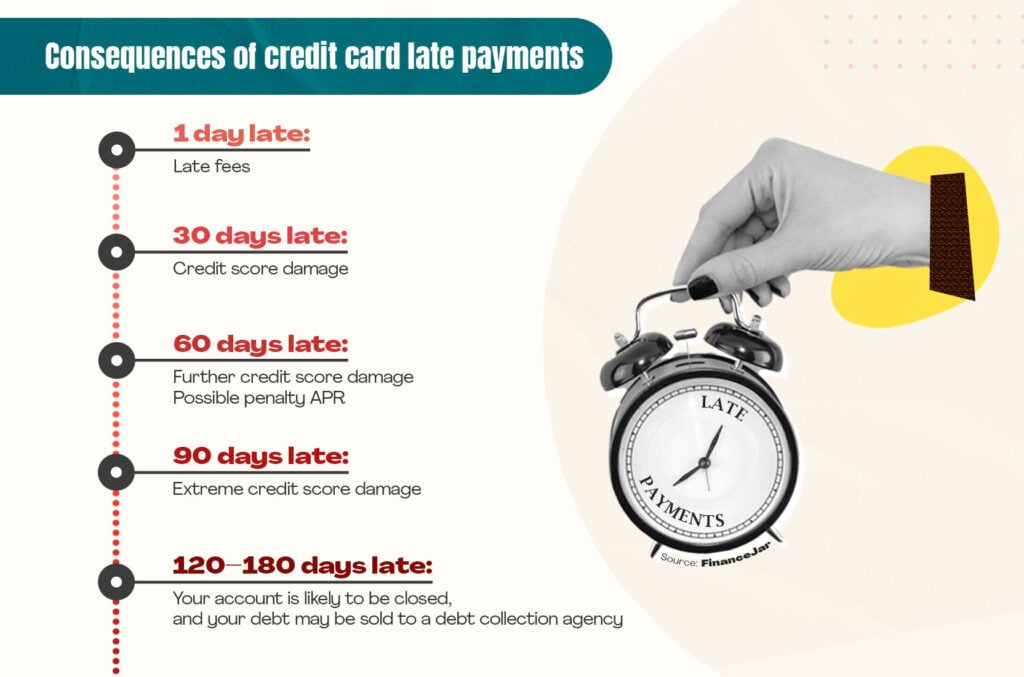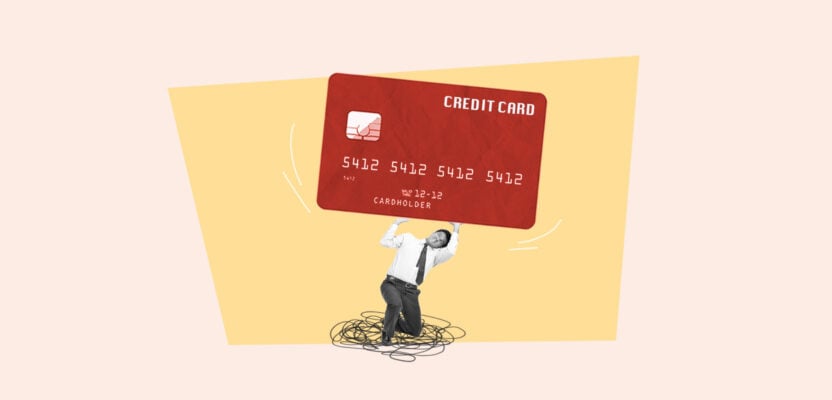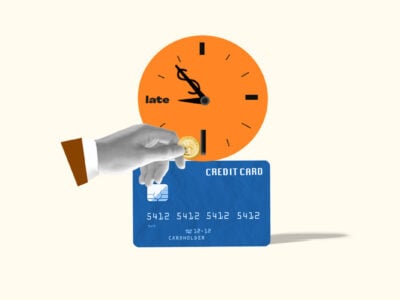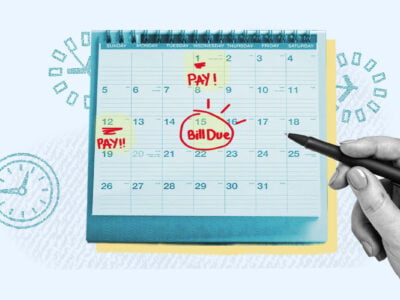Missing a payment here and there on your credit card happens. While you should avoid it if you possibly can, it’s sometimes unavoidable—emergencies crop up, your funds get low, and you can’t make your bill that month.
Missing a single credit card payment probably won’t be a catastrophe, but missing more than one might be. Learn everything that can happen if you stop paying your card and what you can do to avoid the consequences.
Table of Contents
What happens if you only make the minimum payment on your credit card?
You might still be making the minimum payments on your credit card but you can’t afford to pay the entire balance. While this is better than not making any payments at all, there are still consequences for leaving unpaid debts on your card:
- You’ll accrue interest: Your credit card’s APR is the annual interest rate of that card. If you divide that number by 12, that’s roughly how much interest you’re being charged each month that you leave a balance on your card. As credit card interest is compounding, the interest charges will be added to your total balance, meaning you’ll be charged more and more interest each month.
- You’ll lose your grace period: Most credit cards offer a grace period in which you aren’t charged interest. Grace periods typically start the last day of your billing cycle and last between 21–30 days. However, if there’s any balance remaining on your card when you enter your grace period, purchases made during this time will continue to accrue interest at the regular rate.
- Your credit score may suffer: Keeping a balance on your credit card raises your credit utilization rate, which is how much of your credit you’re using at a given time. A high credit utilization rate can damage your credit score, so you want to do everything you can to keep the amount of credit card debt you have each month to a minimum.
What happens if you don’t pay your credit card bill at all?
If you don’t (or can’t) make the minimum payment on your credit card bill, the ramifications may include late fees, damage to your credit score, closure of your account, and potentially even lawsuits.
Timeline: Consequences of Missing a Credit Card Payment

To break that down in more detail, here’s what you’ll face if you stop paying your credit card bills:
Late fees
The first consequence for not paying your credit card bill will be late fees. Most credit cards will charge a late fee (usually between $29–$40) when you miss a minimum monthly payment. Each subsequent month you miss a payment, you’ll be charged another late fee.
Many credit card issuers will raise their late fee as your bill continues to go unpaid. For example, your first missed payment may cost you $20, your second one $30, and your next one $40.
Your late fee will be added to your credit card balance and will accumulate interest at the same rate as the rest of your debt.
Keep in mind that some card issuers may waive your first late fee automatically, and others might be willing to waive the fee if you call them and explain your situation and vow to make the required payment shortly. If you have a good reason (e.g., unexpected medical bills that have left you scrambling), be sure to mention that.
Credit score damage
Once your payment is more than 30 days late, your credit card issuer can report the late payment to the three major credit bureaus. However, some issuers choose to wait 60 days before reporting late payments. 2
Once your late payment is reported, it will show up on your credit report. Your credit report is the information used to generate your credit score.
As your payment history counts toward 35%–41% of your credit score, having late payments on your record could significantly damage your credit.
The longer your payments are late, the more your score will suffer. A 90-day late payment will hurt your score significantly more than a 30-day late payment. 3
Additionally, your credit utilization rate may also suffer, as mentioned earlier. Credit utilization is the second most important credit score factor, so missing payments for 30 days or more can cause credit score damage on two major fronts.
Penalty APR
Once your payment is late for 60 days or more, your credit card issuer can start charging you a penalty APR. This is a higher interest rate that will be applied to your credit card balance.
Penalty APRs vary by credit card issuer, credit card, and borrower, but they tend to be near 30%. 4 This is much higher than the average credit card purchase APR of 14–16%.
With a higher interest rate, your credit card debt will grow even faster. Make avoiding penalty APR a priority so you don’t become buried in too much credit card debt to ever pay back.
Credit card closure
Once your account has been overdue for 90 days or more, your lines of credit may be reduced or taken away.
If your issuer reduces your credit limit, it may leave you without available credit and further damage your credit utilization rate. Your issuer might also close your account entirely. If they do this, they’ll probably send your unpaid debts to a debt collection agency, which we’ll get into shortly.
Penalties from your other creditors
Having a delinquent credit account can have far-reaching consequences for your credit. As mentioned, your missed payments may begin showing up on your credit report after just 30 days, and other lenders can access your credit report and see your pattern of risky borrowing.
They may respond by:
- Reducing your credit limit
- Raising your interest rate
- Changing your borrowing terms (like fees)
- Closing your account
- Denying you other accounts in the future
Delinquency on a credit card won’t just affect that credit card—it can follow you throughout your borrowing journey, both now and in the future.
Collections account
If you’ve failed to pay your credit card for 120–180 days, your lender may charge off your account and transfer it to a debt collection agency or debt buyer. 5
Once an account is charged off, that line of credit will be permanently closed. You’ll still have a short window of time in which you can pay off the account before it’s transferred, and you should always pay off closed accounts during this period if you possibly can. Once your debt is transferred or sold to a debt buyer or collector, the new owner or collector of your debt will begin demanding repayment from you.
Charge-offs and collections are both very damaging to your credit score. Additionally, if a collection appears on your credit report, your credit card debts will appear twice on your credit report—you’ll have a mark from both your original creditor and the debt collector, which will look even worse to lenders.
Lawsuits
Failure to pay your credit card bills can result in a lawsuit.
Debt collectors can sue you for failing to pay your debts. If the court awards them a judgment—i.e., if they win the case—they can legally take money from you in various ways in order to pay off your debts.
A judgment can give creditors and debt collectors the right to:
- Garnishing your wages: The creditor may take a percentage of your income, up to 25%.
- Putting a lien on your property: Once a creditor puts a lien on your property, they can seize it. Property can include real estate (e.g., your house) or personal property (e.g., your car or other valuables).
- Putting a levy on your property: Similar to a lien, a levy places a claim on your property. If a levy is enacted, a sheriff or marshal will take your property, sell it, and put the funds toward your debt repayment.
- Place an assignment order: Assignment orders are put on assets that cannot be subject to a lien or levy. For example, an assignment order could be placed on your tax refund. In this case, the future funds would go directly to the creditor once issued.
Thankfully, you won’t need to worry about damage to your credit because judgments shouldn’t appear on your credit report (and you can easily remove any judgments that happen to slip through).
However, in addition to the debt repayment and property loss that may result from a lawsuit, you’ll lose even more money in legal fees and you’ll need to spend time in court. Needless to say, you should avoid this if you possibly can.
Can you go to jail for not paying your credit card bills?
No, you can’t go to jail for debt, including credit card debt. Debtors’ prisons have been illegal under federal law for almost 200 years. 6
However, if you’re taken to court over the debt (i.e., sued by your creditor) and fail to show up or respond to the court order, you can be held in contempt of court.
The punishment for being held in contempt varies by state, court, and circumstance, but in extreme cases, you can be sent to jail (or even prison) for it.
What should you do if you can’t pay your credit card debts?
If you’re struggling to repay your credit card debts and aren’t sure what to do, there are several options to consider. First, stop using your credit cards immediately. Sinking further into debt will only make repayment more difficult.
After that, you have several options you should consider, including debt settlement, debt consolidation, talking to a credit counselor, and (in extreme cases) declaring bankruptcy.
Here are the pros and cons of those methods in more detail.
Debt settlement
Many credit card companies may be receptive to debt settlement. This is when you negotiate with your creditor to clear your debt in exchange for a partial payment. Debt settlement will harm your credit score, but not as much as leaving your debt completely unpaid.
Hardship programs
Some credit card issuers offer hardship programs in which you negotiate your credit card debt to get better terms. Issuers are especially inclined to offer these if there are extenuating circumstances behind your failure to pay your credit cards.
For example, if you recently suffered a medical catastrophe, divorce, or job loss, your credit card issuer may offer a hardship program in which they’ll lower your interest rate or defer your interest charges, waive or defer your fees, and forgive your late payments.
Debt consolidation
Another option for credit card repayment is debt consolidation, i.e., moving your debts onto another card or loan with a lower interest rate. There are many forms of debt consolidation, all with the same end: make paying off your debts simpler and more manageable.
Credit counseling
If you’re having trouble tackling your credit card debt on your own, consider contacting a credit counselor. A counselor can help you manage your finances and enroll in a debt management plan.
Debt management plans are designed to help you repay your debts while minimizing the damage to your credit and overall financial health. Debt repayment plans often involve negotiating a fixed payment plan so that you can pay more easily with more favorable interest rates and fees.
Bankruptcy
If you’re out of other options, another way to get out of credit card debt is to declare bankruptcy. This is an extreme option. Bankruptcy has a lot of downsides, most notably that it will severely damage your credit score for 7 to 10 years before it falls off of your credit report.
However, it can be an effective last resort for getting out of insurmountable debt. Bankruptcy comes in two forms:
- Liquidation bankruptcy: This is also known as chapter 7 bankruptcy. If you pursue this, you’ll first sell off most of your assets, then the court will forgive certain debts. If you’ve liquidated your assets and you still aren’t able to pay your credit card debt, it will be discharged and you’ll no longer be required to pay it.
- Rehabilitation bankruptcy: With this form of bankruptcy, you won’t be required to liquidate your assets, but you also may not have your debts fully discharged. Instead, some debts may be discharged while you’ll be required to repay others over a 3–5 year span.
Again, bankruptcy is an option of last resort. If you’re considering it, talk to a professional (such as a credit counselor, financial advisor, or an attorney who specializes in bankruptcy) before you commit.






